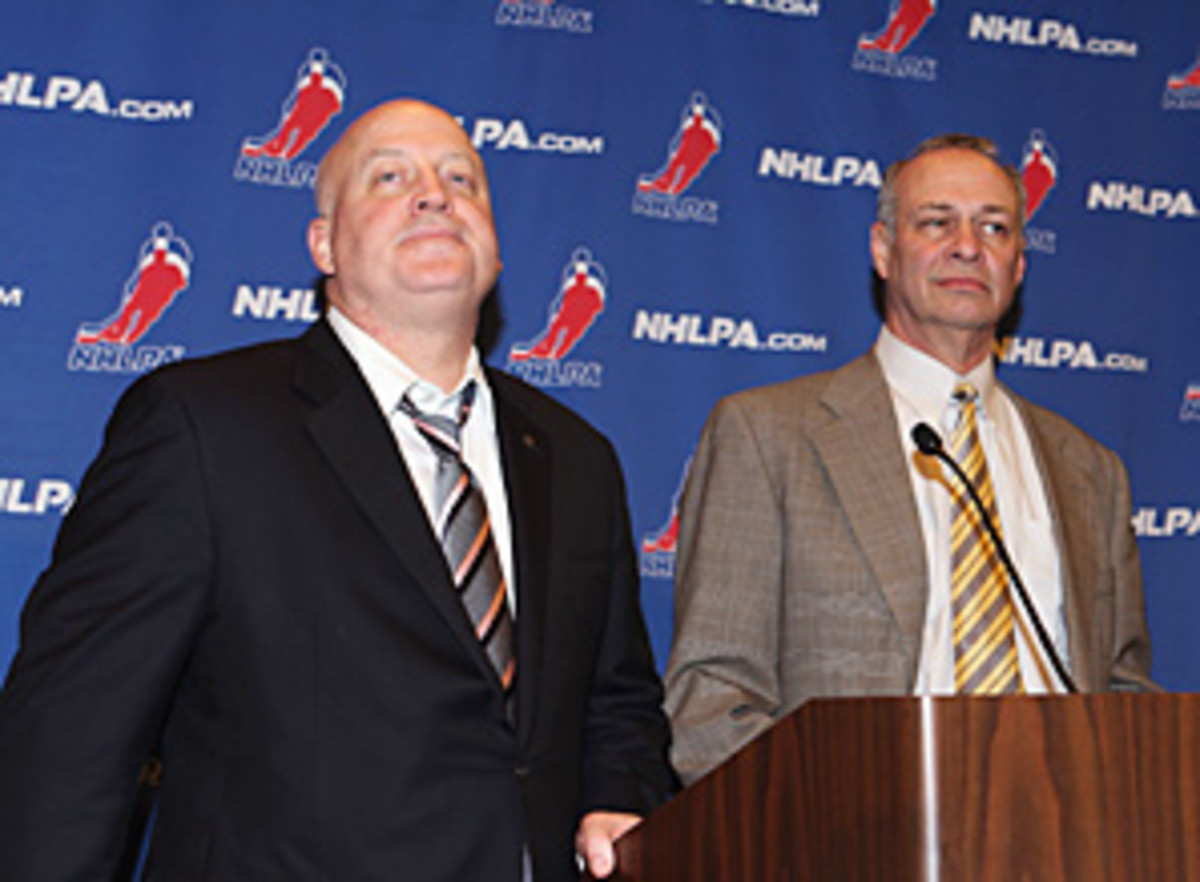NHL players, owners hope to keep tenuous CBA talks going
NEW YORK (AP) -- After spending most of Thursday apart, the NHL and the players' association are back together for the latest round of negotiations aimed at ended the long lockout.
The sides are meeting for the third straight day as they try to find a way to make a deal that would allow the delayed hockey season to start. Optimism that emerged late Tuesday night seems to have waned as conversations continued.
The dynamic of having owners and players at the bargaining table without NHL Commissioner Gary Bettman and union leader Donald Fehr also appears to have lost some of his luster. It wasn't immediately known who was in attendance for the meeting that began shortly after 5 p.m., but some owners who sat in on Tuesday and Wednesday have left and Bettman was said to not be on the premises.
NHL deputy commissioner Bill Daly said after marathon talks ended shortly before 1 a.m. Thursday that the league would wait to hear from the union regarding "some critical open issues" before getting back to the bargaining table.
After an optimistic feeling following long talks on Tuesday, the mood turned on Wednesday. Gone was some of the lightheartedness and positive vibes expressed earlier in the week and there were no joint statements by the two sides.
KWAK: The sobering reality
In fact, the union wanted federal mediators to rejoin the discussions. A similar request was turned down by the league earlier this week. Mediators previously were unsuccessful creating a breakthrough in two days of discussions last week.
Representatives of the league and the players each said Wednesday's long talks were "candid," and both said they looked forward to more talks Thursday.
There is no doubt that work still needs to be done for a deal to be made that would save the hockey season.
"We had good, candid dialogue," Daly said early Thursday after nearly nine hours of talks at a Manhattan hotel. "There continue to be some critical open issues between the two parties, and we understand the union should be getting back to us (Thursday) on some of those issues."
It isn't known what progress has been made so far, but owners and players understand that an agreement must be reached soon if they hope to get the game back on the ice this season.
"We had a series of candid discussions. We will meet again tomorrow," said Winnipeg Jets defenseman Ron Hainsey, who like Daly didn't take any questions after the talks ended for the night.
Negotiations resumed a little after 2 p.m. Wednesday and proceeded in fits and starts as the league and the players' association searched for an agreement. As they had the day before, talks went deep into the night, breaking two hours for dinner before finishing in the early morning hours.
HACKEL: Five possible reasons for sudden change
Citing unidentified sources, The Canadian Press reported that the league -- which wants an even split of annual revenue with players - had increased its offer of a "make whole" payment to the players from $211 million to $300 million. The union had asked for $393 million. The catch, CP reported, is that the offer was tied to deals on other issues such as player contracting rights.
One point of contention is the length of a new contract, with owners looking for a 10-year pact, and players wanting a shorter term -- perhaps five years. The league also is seeking to limit the length of individual player contracts to five years.
Owners often retreated to their room one floor above the location of the bargaining session and then took the elevator back down to get talks going again. Some of the joint sessions lasted only 15 minutes.
Cautious optimism emerged Tuesday in the first round of talks that kept Bettman on the outside along with Fehr, while six owners and about 18 players talked inside. The positive feeling carried over into Wednesday morning when various team executives said they heard good reports during an NHL board of governors meeting.
If a breakthrough can be made soon, the delayed and shortened hockey season could get going quickly.
The sides are trying to avoid another lost season. The NHL became the first North American professional sports league to cancel a full year because of a labor dispute back in 2005. The deal reached then was in place until this September, and the lockout was enacted on Sept. 16 after that agreement expired.
The lockout reached its 82nd day Thursday. The main issues are how to split revenue and how player contracts are set up. The league had more than $3 billion in revenue in the 2011-12 season, but an analysis by Forbes magazine recently showed a major gap between profitable teams and those that operate in the red.
All games through Dec. 14, along with the New Year's Day Winter Classic and the All-Star game, have been wiped off the schedule so far.

































